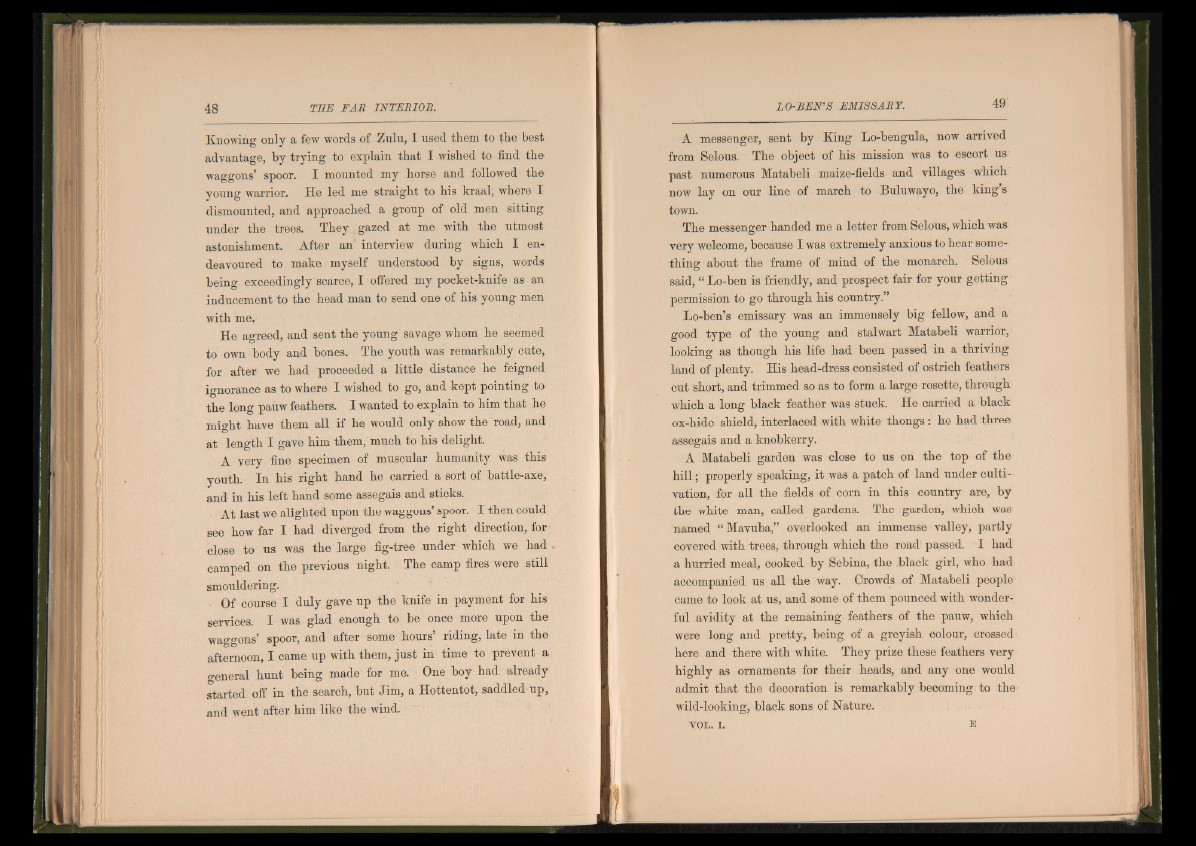
Knowing only a few words of Zulu, I used them to the best
advantage, by trying to explain that I wished to find the
waggons’ spoor. I mounted my horse and followed the
young warrior. He led me straight to his kraal, where I
dismounted, and approached a group of old men sitting
under the trees. They gazed at me with the utmost
astonishment. After an interview during which I endeavoured
to make myself understood by signs, words
beinov exceedingly scarce, I offered my pocket-knife as an
inducement to the head man to send one of his young men
with me.
He agreed, and sent the young savage whom he seemed
to own body and bones. The youth was remarkably cute,
for after we had proceeded a little distance he feigned
ignorance as to where I wished to go, and kept pointing to
the long pauw feathers. I wanted to explain to him that he
might have them all if he would only show the road, and
at length I gave him them, much to his delight.
A very fine specimen of muscular humanity was this
youth. In his right hand he carried a sort of battle-axe,
and in his left hand some assegais and sticks.
At last we alighted upon the waggons’ spoor. I then could
see how far I had diverged from the right direction, for
close to us was the large fig-tree under which we had
camped on the previous night. The camp fires were still
smouldering.
Of course I duly gave up the knife in payment for his
services. I was glad enough to be once more upon the
waggons’ spoor, and after some hours’ riding, late in the
afternoon, I came up with them, just in time to prevent a
general hunt being made for me. One boy had already
started off in the search, but Jim, a Hottentot, saddled up,
and went after him like the wind.
A messenger, sent by King Lo-bengula, now arrived
from Selous. The object of his mission was to escort us
past numerous Matabeli maize-fields and villages which
now lay on our line of march to Buluwayo, the king’s
town.
The messenger handed me a letter from Selous, which was
very welcome, because I was extremely anxious to hear something
about the frame of mind of the monarch. Selous
said, “ Lo-ben is friendly, and prospect fair for your getting
permission to go through his country.”
Lo-ben’s emissary was an immensely big fellow, and a
good type of the young and stalwart Matabeli warrior,
looking as though his life had been passed in a thriving
land of plenty. His head-dress consisted of ostrich feathers
cut short, and trimmed so as to form a large rosette, through
which a long black feather was stuck. He carried a black
ox-hide shield, interlaced with white thongs: he had three
assegais and a knobkerry.
A Matabeli garden was close to us on the top of the
h ill; properly speaking, it was a patch of land under cultivation,
for all the fields of corn in this country are, by
the white man, called gardens. The garden, which was
named “ Mavuba,” overlooked an immense valley, partly
covered with trees, through which the road passed. I had
a hurried meal, cooked by Sebina, the .black girl, who had
accompanied us all the way. Crowds of Matabeli people
came to look at us, and some of them pounced with wonderful
avidity at the remaining feathers of the pauw, which
were long and pretty, being of a greyish colour, crossed
here and there with white. They prize these feathers very
highly as ornaments for their heads, and any one would
admit that the decoration is remarkably becoming to the
wild-looking, black sons of Nature.
von. i. e